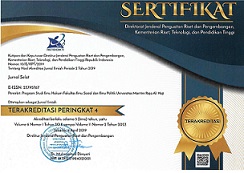Implikasi Putusan Mahkamah Konstitusi Nomor 91/PUU-XVIII Tentang Uji Materi Undang-Undang Nomor 11 Tahun 2020
DOI:
https://doi.org/10.31629/selat.v9i2.4188Keywords:
Implications, Decisions, Copyright Act, Constitutional CourtAbstract
After the promulgation of Law Number 11 of 2020 concerning Job Creation, there are still various responses and a judicial review application has even been submitted to the Constitutional Court (MK). Several points in the minutes of the Constitutional Court's decision have legal implications. This paper analyzes the Constitutional Court Decision Number 91/PUU-XVIII concerning the Judicial Review of Law Number 11 of 2020 concerning Job Creation and the executive power of the Constitutional Court against the Judicial Review of Law Number 11 of 2020 concerning Job Creation. The research method in this paper is normative. It is normative because it uses secondary data to examine rules or norms. This research is descriptive in nature so that researchers try to describe the object or present a complete picture of the object or subject under study in accordance with the circumstances as they are with the aim of systematically describing the facts and characteristics of the object or subject being studied appropriately. The results of the discussion show that the Constitutional Court Decision Number 91/PUU-XVIII concerning the Judicial Review of Law Number 11 of 2020 concerning Job Creation has provided legal implications, namely improvements were made within the specified time limit and a prohibition on issuing new implementing regulations related to the Act. -Copyright Act.
References
Buku
Abdul Latif, etc. (2009). Buka Ajar Hukum Acara Mahkamah Konstitusi. Total Media.
Fajar Laksono, dkk,. (2013). Implikasi Dan Implementasi Putusan Mahkamah Konstitusi Nomor 5/PUU-X/2012 tentang Sekolah Bertaraf Internasional (SBI)/ Rintisan Sekolah Bertaraf Internasional (RSBI). Kepaniteraan dan Sekretariat Jenderal Mahkamah Konstitusi Republik Indonesia.
Lili Rasjidi dan I.B. Wyasa Putra. (1993). Hukum Sebagai Suatu Sistem. Remaja Rosda Karya.
Maruar Siahaan. (2005). Hukum Acara Mahkamah Konstitusi Republik Indonesia. Konstitusi Press.
Mochtar Kusumaatmadja. (2012). Mochtar Kusumaatmadja dan Teori Hukum Pembangunan. Epistema Institute dan Huma.
Satjipto Rahardjo. (1996). Ilmu Hukum. PT Citra Aditya Bakti.
Winarno Surakhmad. (1990). Pengantar Penelitian Ilmiah: Dasar, Metode, dan Teknik. Tarsito.
Jurnal
Denny Indrayana dan Zainal Arifin Muchtar. (2007). Komparasi Sifat Mengikat Putusan Judicial Review Mahkamah Konstitusi dan Pengadilan Tata Usaha Negara. Mimbar Hukum, 19(3).
Maruarar Siahaan. (2009). Peran Mahkamah Konstitusi Dalam Penegakan Hukum Konstitusi. Jurnal Hukum, 16(3), 359.
Sodikin. (2020). Paradigma Undang-Undang Dengan Konsep Omnibus Law Berkaitan Dengan Norma Hukum yang Berlaku di Indonesia. Jurnal RechtsVinding, 9(1), 147–148.
Wahyu Nugroho. (2013). Menyusun Undang-Undang yang Responsif dan Partisipatif Berdasarkan Cita Hukum Pancasila. Jurnal Legislasi Indonesia, 10(3), 215.
Peraturan Perundang-Undangan
Undang-Undang Nomor 11 Tahun 2020 tentang Cipta Kerja.
Undang Nomor 24 Tahun 2003 tentang Mahkamah Konstitusi sebagaimana telah diubah dengan Undang-Undang
Nomor 8 Tahun 2011 tentang Mahkamah Konstitusi
Undang-Undang Nomor 15 Tahun 2019 tentang Perubahan atas undang-Undang Nomor 12 Tahun 2011 tentang Pembentukan Peraturan Perundang-Undangan
Artikel
Nuhansa Mikrefin. (2011, February). PKS Kritik Bank Tanah, Dibentuk setelah Putusan MK soal UU Ciptaker. Https://Katadata.Co.Id/Yuliawati/Berita/61dea19042aee/Pks-Kritik-Bank-Tanah-Dibentuk-Setelah-Putusan-Mk-Soal-Uu-Ciptaker,.






